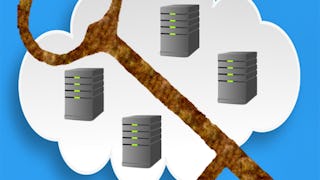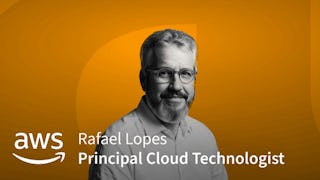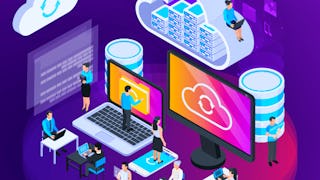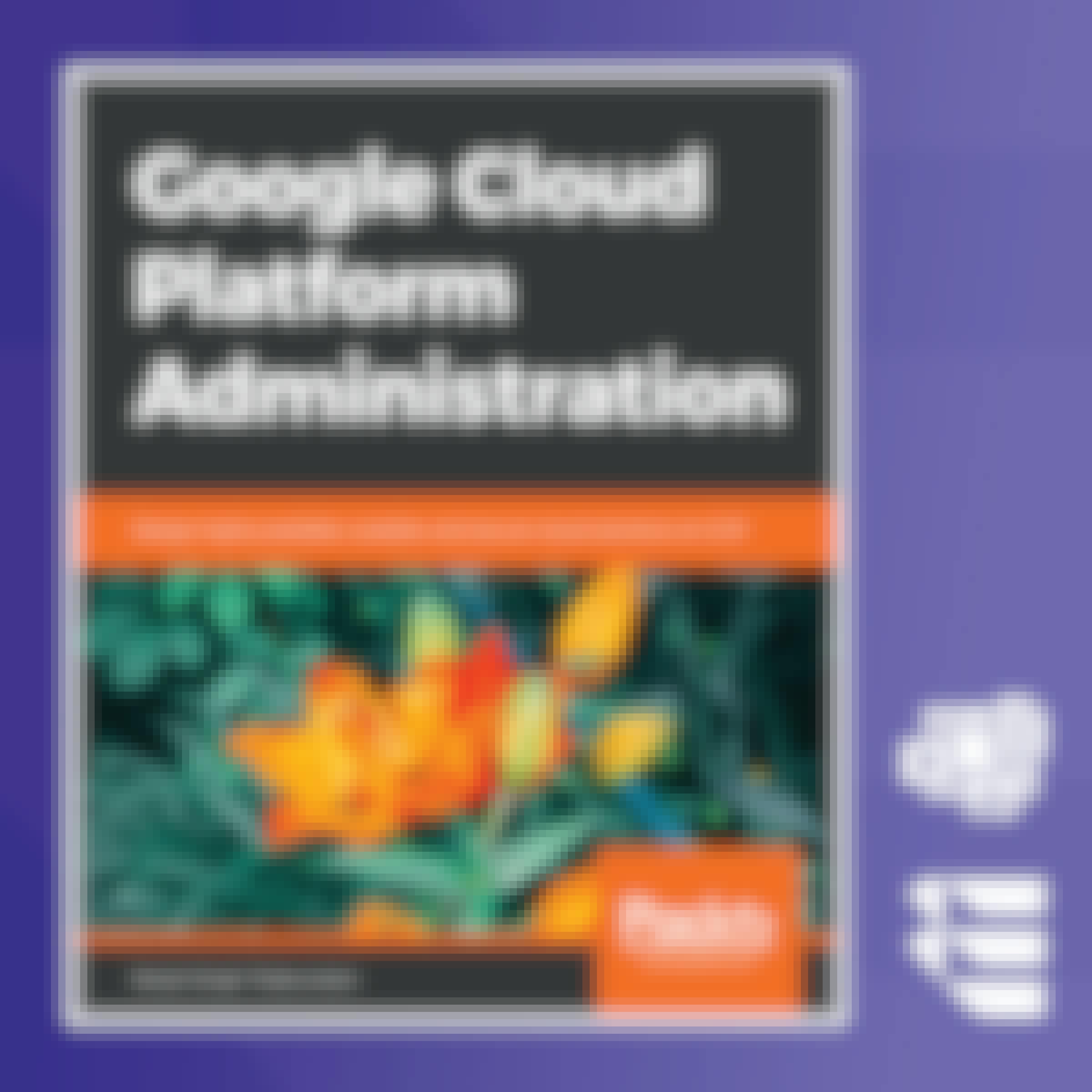- Browse
- Mobile Cloud Computing
Mobile Cloud Computing Courses
Mobile cloud computing courses can help you learn about app development, cloud architecture, data management, and network security. You can build skills in optimizing mobile applications for cloud environments, ensuring data synchronization, and implementing secure APIs. Many courses introduce tools like AWS, Google Cloud, and Azure, along with frameworks such as React Native and Flutter, to help you understand how to deploy and manage mobile applications effectively in a cloud setting.
Popular Mobile Cloud Computing Courses and Certifications
 Status: Free TrialFree TrialM
Status: Free TrialFree TrialMMicrosoft
Skills you'll gain: Microsoft Azure, Virtual Machines, Scalability, Cloud Computing, Cloud Services, Infrastructure As A Service (IaaS), Cloud Infrastructure, Virtual Networking, Kubernetes, Cloud Security, Network Security, Network Routing, Load Balancing, Application Deployment, Operating System Administration, Identity and Access Management, Security Information and Event Management (SIEM)
4.8·Rating, 4.8 out of 5 stars30 reviewsBeginner · Course · 1 - 4 Weeks
 Status: Free TrialFree TrialE
Status: Free TrialFree TrialEEdureka
Skills you'll gain: Amazon S3, AWS Identity and Access Management (IAM), Amazon Elastic Compute Cloud, Amazon Web Services, Identity and Access Management, Cloud Deployment, Cloud Computing, Cloud Computing Architecture, Cloud Infrastructure, Command-Line Interface, Public Cloud, Cloud Storage, Multi-Factor Authentication, Data Storage, Scalability
Intermediate · Course · 1 - 3 Months
 Status: Free TrialFree TrialU
Status: Free TrialFree TrialUUniversity of Minnesota
Skills you'll gain: Open Web Application Security Project (OWASP), Cloud Security, Authentications, Key Management, Cloud Applications, Application Security, Secure Coding, DevSecOps, Cloud Computing, Cloud Services, Identity and Access Management, Multi-Factor Authentication, Security Testing, Cryptography, Web Services, Server Side
4.3·Rating, 4.3 out of 5 stars27 reviewsIntermediate · Course · 1 - 4 Weeks
 G
GGoogle Cloud
Skills you'll gain: Relational Databases, Database Administration, Google Cloud Platform, Databases, Database Systems, Database Management, SQL, Database Architecture and Administration, Cloud Applications, Data Migration, Database Design, Dataflow, Query Languages, Cloud Management, Application Deployment, Transaction Processing, System Monitoring, Authentications
Intermediate · Course · 1 - 3 Months
 A
AAmazon Web Services
Skills you'll gain: AWS Identity and Access Management (IAM), Infrastructure as Code (IaC), Command-Line Interface, Amazon CloudWatch, AWS CloudFormation, Root Cause Analysis, Amazon DynamoDB, Customer Relationship Building, Network Troubleshooting, Amazon Web Services, Customer Relationship Management, Software Architecture, Linux Commands, Cloud Computing, Linux, Amazon S3, Web Applications, Information Technology, Customer Service, Software Development
4.8·Rating, 4.8 out of 5 stars6.7K reviewsBeginner · Professional Certificate · 3 - 6 Months
 Status: Free TrialFree Trial
Status: Free TrialFree TrialSkills you'll gain: Kubernetes, Google Cloud Platform, Serverless Computing, Cost Management, Cloud Infrastructure, Cloud Computing Architecture, Cloud Services, Cloud Computing, Infrastructure As A Service (IaaS), Hybrid Cloud Computing, Cloud Management, Data Processing, System Monitoring, Application Performance Management, Cloud Security, Big Data, Identity and Access Management, Data Warehousing, Key Management, Virtual Private Networks (VPN)
Intermediate · Specialization · 1 - 3 Months
 Status: NewNewG
Status: NewNewGGoogle Cloud
Skills you'll gain: Google Gemini, Google Cloud Platform, Generative AI Agents, AI Security, AI Orchestration, Model Deployment, LLM Application, Artificial Intelligence, Generative AI, Agentic systems, Cloud Deployment, Large Language Modeling, Enterprise Security
Beginner · Course · 1 - 3 Months
 Status: Free TrialFree TrialStatus: AI skillsAI skillsM
Status: Free TrialFree TrialStatus: AI skillsAI skillsMMicrosoft
Skills you'll gain: Microsoft 365, Network Security, Cloud Management, Microsoft Azure, Business Software, Computer Hardware, Virtual Machines, Identity and Access Management, Cybersecurity, Network Troubleshooting, Microsoft Office, Desktop Support, Virtual Private Networks (VPN), Azure Active Directory, Technical Support and Services, Technical Support, System Monitoring, Disaster Recovery, Cloud Computing, Network Protocols
4.7·Rating, 4.7 out of 5 stars1.5K reviewsBeginner · Professional Certificate · 3 - 6 Months
 Status: NewNewP
Status: NewNewPPearson
Skills you'll gain: Google Cloud Platform, Virtual Machines, Kubernetes, Cloud Computing, Serverless Computing, Artificial Intelligence and Machine Learning (AI/ML), Cloud Management, Containerization, Command-Line Interface, Cloud Security, Big Data, Analytics
Beginner · Course · 1 - 4 Weeks
 Status: NewNew
Status: NewNewSkills you'll gain: Google Cloud Platform, Cloud Management, Cloud Infrastructure, Application Deployment, Kubernetes, Cloud Computing, Cloud Platforms, Public Cloud, Identity and Access Management, Cloud Security, Network Administration, Cloud Storage, Devops Tools, Virtual Machines, System Monitoring, Containerization, Application Performance Management, Virtual Networking, Firewall
Intermediate · Course · 1 - 3 Months
 Status: Free TrialFree TrialB
Status: Free TrialFree TrialBBoard Infinity
Skills you'll gain: Billing Systems, Billing, Cloud Management, Cost Management, Cost Control, Budget Management, Financial Management, Budgeting, Virtual Machines, Cloud Computing, Cost Accounting, Expense Management, Cost Reduction, Virtualization and Virtual Machines, Case Studies, Financial Analysis, Resource Utilization
Intermediate · Course · 1 - 4 Weeks
 G
GGoogle Cloud
Skills you'll gain: Google Cloud Platform, Cloud Applications, Database Administration, Database Management, Cloud Deployment, Database Design, Query Languages, Transaction Processing, Terraform, Data Migration, Authentications
Intermediate · Course · 1 - 3 Months
In summary, here are 10 of our most popular mobile cloud computing courses
- Azure Cloud Services: Microsoft
- AWS Cloud Essentials: Edureka
- Cloud Application Security: University of Minnesota
- Comprende Cloud Spanner: Google Cloud
- AWS Cloud Support Associate: Amazon Web Services
- Exam Prep: Google Cloud Certified Associate Cloud Engineer: Whizlabs
- Understand Google Cloud Agents: Google Cloud
- Microsoft Cloud Support Associate: Microsoft
- Google Cloud Essentials: Pearson
- Google Cloud Platform Administration: Packt










